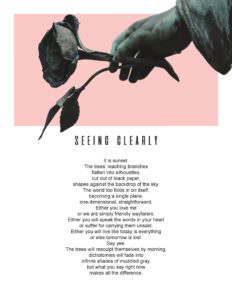Seeing Clearly: Finding Clarity in the Dark

Editor’s note: As part of FMS’ Lenten blog series, Kathleen Strycula, guest blogger, graphic designer, and DC Service Corps Alum considers the true meaning of clarity. Is it really about being able to see, or is it about something else? Kathleen’s original poem complements her prose, inviting us to prayerfully consider how seeing clearly might prompt us to say “yes” and commit to a call.
It’s ironic, but when I began to think about what it means to see clearly, St. Paul’s conversion came, unbidden, to my mind.
Why, I wondered, did that particular event come to mind?
St. Paul surely couldn’t be said to have been seeing clearly before Jesus appeared to him on the road to Damascus, bent as he was on the vengeful eradication of the early Christians. And he literally couldn’t be said to see clearly after Jesus spoke to him: “things like scales” (Acts 9:18) covered his eyes, and he had to be led by the hand to his destination.

And yet, St. Paul’s most powerful conversion, his deepest spiritual insights, came to him precisely when he was blind and couldn’t see clearly. He hears the voice of Christ, fasts and prays for three days, is baptized, and begins to proclaim the Gospel to all who will listen. His life is turned around during those dark days when he couldn’t see.
Sometimes when I think about or pray for clarity of sight in my spiritual life, I have this mental image of standing on a hilltop with a panoramic, crystal-clear view on all that is going on in my life and all that’s coming. That is what I long for when I feel confused or unsure of where to go.
What could be clarity other than knowing where you’re headed and seeing the path to get there? But the truth of it is, things are much messier, hazier, and more uncertain. Our earth-bound vision can’t see so far or so well.
Maybe that’s the point.
Maybe seeing clearly isn’t about seeing far or seeing everything. Maybe it’s having the clarity to see that we can’t see clearly that frees our gaze to turn wholly to God. When St. Paul realized he was blind, he let himself be led. When he couldn’t see anything or anyone else, he focused on the words that Christ had spoken to him.
“Get up and go” is repeated nearly five times throughout the account of Paul’s conversion. Even when he can’t see, Paul is called forth. Christ doesn’t tell him to wait until he has recovered his sight and then go to Damascus; Paul’s blindness is a part of his call and conversion. His blindness becomes a means to greater trust and clarity.
We may feel spiritually blind. We may not be able to see where the paths of our life lead. And yet we are still called. We can “get up and go,” even in the darkness. May St. Paul give us courage in these times, so that our darkness can paradoxically lead to seeing God more clearly.
Tagged in:
